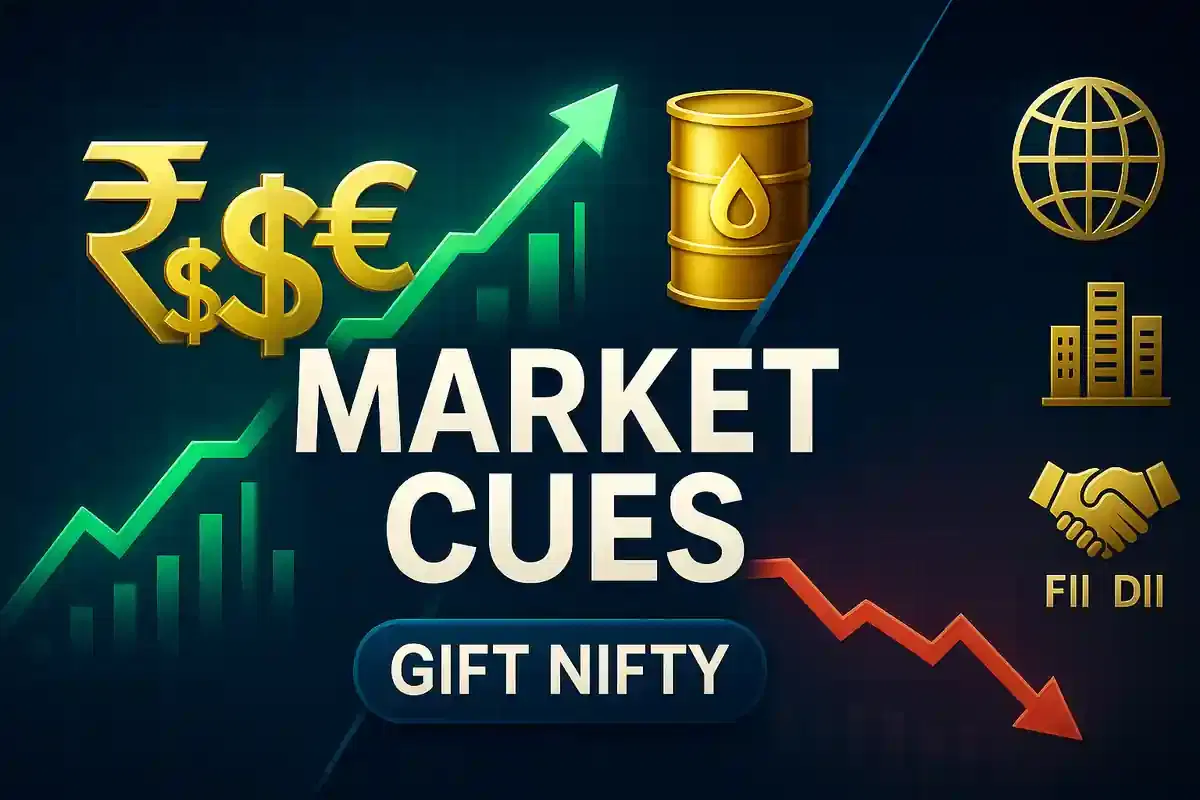Global Markets Mixed, GIFT Nifty Edges Higher Amid Strong FII/DII Buying and Crude Oil Gains
Economy
|
29th October 2025, 2:02 AM

▶
Short Description :
Detailed Coverage :
Global financial markets are exhibiting a mixed trading sentiment as investors digest various economic indicators. In India, the GIFT Nifty is trading 56 points higher, indicating a positive start for domestic equities. This follows a session where the NSE Nifty 50 closed 0.11% lower and the BSE Sensex declined 0.18%.
Key global cues include the performance of US equity futures, which were little changed, with Dow Jones futures down slightly and Nasdaq 100 futures up marginally. Asian markets, however, showed strength, with Japan's Nikkei 225 reaching a fresh record high, driven by expectations of a potential 25 basis point interest rate cut by the US Federal Reserve. South Korea's Kospi saw a modest rise.
The US Dollar Index (DXY) experienced a slight dip, while the Indian Rupee saw a marginal depreciation against the dollar. Crude oil prices, both WTI and Brent, traded higher by 0.29%.
Significant positive sentiment came from institutional investment data. Foreign institutional investors (FII) were substantial net buyers, investing Rs 10,339.80 crore, and Domestic Institutional Investors (DII) also showed net buying worth Rs 1,081.55 crore on October 28, 2025.
Gold prices are trading near their all-time highs, with 24-carat gold priced at Rs 1,19,930 per 10 grams, although it has seen a 2% drop over the past week.
Impact: This confluence of factors, including positive FII/DII flows and rising crude oil prices, could provide support to the Indian stock market, though global mixed trends may introduce volatility. The anticipation of US rate cuts could be a tailwind for emerging markets. The strong buying by institutional investors is a bullish sign. The elevated gold prices might attract some investor caution or indicate broader economic uncertainty. Rating: 8/10
Difficult Terms:
GIFT Nifty: An index that represents the opening range of Indian stocks, traded in Singapore. It's often seen as a precursor to the performance of the NSE Nifty 50.
NSE Nifty 50: A benchmark Indian stock market index that represents the weighted average of 50 of the largest Indian companies listed on the National Stock Exchange.
BSE Sensex: A benchmark Indian stock market index that represents the weighted average of 30 of the largest and most actively traded stocks on the Bombay Stock Exchange.
Dow Jones Industrial Average: A stock market index that represents 30 large, publicly owned companies traded on the New York Stock Exchange and the Nasdaq.
S&P 500: A stock market index that measures the stock performance of 500 of the largest companies listed on stock exchanges in the United States.
Nasdaq 100: An index of the 100 largest non-financial companies listed on the Nasdaq stock exchange.
Nikkei 225: The benchmark stock market index for the Tokyo Stock Exchange, consisting of 225 top blue-chip companies.
Topix: A stock market index for the Tokyo Stock Exchange, which includes all domestic companies in the First Section.
Kospi: The Composite Price Index of South Korea, representing all common stocks traded on the Korea Exchange.
Kosdaq: A stock market index in South Korea, comprising small and medium-sized companies listed on the Kosdaq market.
US Dollar Index (DXY): An index that measures the value of the United States dollar relative to a basket of foreign currencies.
WTI crude: West Texas Intermediate, a benchmark grade of crude oil used for pricing in North America.
Brent crude: A major global oil benchmark, produced in the North Sea.
Foreign institutional investors (FII): Overseas entities, such as pension funds, mutual funds, and insurance companies, that invest in the financial markets of another country.
Domestic institutional investors (DII): Indian entities, such as mutual funds, insurance companies, and banks, that invest in the Indian financial markets.